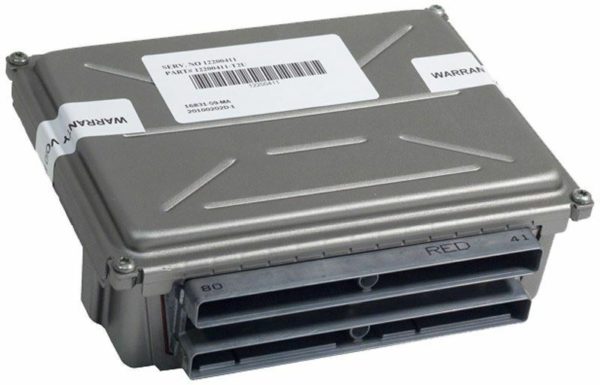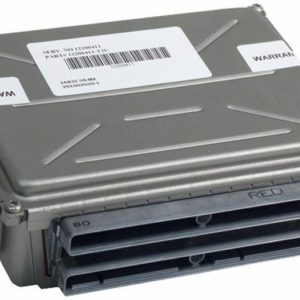Is Your Vehicle Running Rough, Stalling, or Refusing to Start?
If you’re dealing with frustrating engine problems in your GM vehicle, a faulty Powertrain Control Module (PCM) is often the hidden culprit. Over my 20+ years in the shop, I’ve seen countless drivers replace expensive parts like fuel pumps and sensors, only to find the real issue was the vehicle’s computer. A failing PCM can cause a cascade of confusing symptoms, from a persistent Check Engine Light and erratic automatic transmission shifting to poor fuel economy and a complete no-start condition. This isn’t just an inconvenience; it’s an unreliable vehicle.
“A customer’s ’99 Malibu came in last week…”
The car had a no-start condition that two other shops had misdiagnosed. They suspected a fuel pump, but the pressure was fine. I went straight to the source. Using my multimeter, I checked the 5-volt reference signal at the Throttle Position Sensor (TPS) and found it was completely dead. This is a classic sign of an internally shorted PCM on these 2.4L and 2.2L GM engines. We replaced the module with one of our pre-programmed units, and the car fired right up and ran perfectly. The customer saved hundreds on unnecessary repairs by correctly identifying the core problem.
The Direct-Fit, Programmed Solution
This isn’t just a replacement part; it’s a complete solution. We take the guesswork and dealer expense out of the equation. When you order, simply provide your vehicle’s 17-digit VIN. Our technicians will then program this PCM with the latest, most stable software updates directly from GM. This ensures your vehicle operates exactly as the manufacturer intended, often correcting factory flaws that existed in the original programming. Your new module arrives ready for a straightforward installation, no expensive scan tools or dealership appointments required.
Common Symptoms of a Failing PCM:
- ✔ Persistent Check Engine Light (CEL)
- ✔ Vehicle won’t start or stalls intermittently
- ✔ Poor or harsh automatic transmission shifting
- ✔ Noticeable decrease in fuel mileage
- ✔ Communication errors with diagnostic scan tools
- ✔ False trouble codes for other sensors
Easy Installation Guide for Your 1997-1999 Grand Am PCM
Replacing the PCM is a job most DIY mechanics can handle in under an hour. The location varies slightly by model, but the process is similar.
- Safety First: Always disconnect the negative terminal from your vehicle’s battery and wait 10 minutes for the system to discharge.
- Locate the Module: On many models like the S10/Sonoma, Cavalier, and Sunfire, the PCM is in the engine bay (often on the passenger side). On sedans like the Grand Am and Malibu, it may be located inside the cabin, typically behind the dash on the driver’s or passenger’s side.
- Disconnect the Harnesses: Carefully unclip the wiring harness connectors from the old PCM. These connectors have locking tabs; be gentle to avoid breaking them.
- Remove the Old Module: Unbolt the old PCM from its mounting bracket.
- Install the New Module: Bolt the new, pre-programmed PCM into place and securely reconnect the wiring harnesses. Ensure they click into place.
- Reconnect the Battery: Re-attach the negative battery terminal. The vehicle is now ready to start.
Expert Pro Tip: Before plugging in your new PCM, take a moment to inspect the harness connectors for any signs of corrosion (green or white powder) or bent pins. A poor connection is the number one cause of repeat failures or immediate issues. Use a small pick to gently straighten any bent pins and a can of quality electrical contact cleaner to ensure a perfect, clean connection. This simple step takes five minutes and can save you hours of troubleshooting.
Guaranteed Compatibility
This module is a direct replacement for several GM vehicles. Please verify your part number or vehicle application below. This unit is compatible with service numbers 16228016, 8162280160, and 16245305.
- Pontiac Grand Am: 1997-1998 (2.4L), 1999 (2.4L, ID 16228016)
- Chevrolet Cavalier: 1997-1999
- Chevrolet Malibu: 1997-1999 (2.4L)
- Chevrolet S10 / GMC Sonoma: 1997-1999 (2.2L), 2000 (2.2L, VIN 4)
- Pontiac Sunfire: 1997-1999
- Isuzu Hombre: 1996, 1997-1998 (2.2L), 1999-2000 (2.2L)
- Buick Skylark: 1997-1998 (2.4L)
- Oldsmobile Achieva: 1997-1998 (2.4L)


